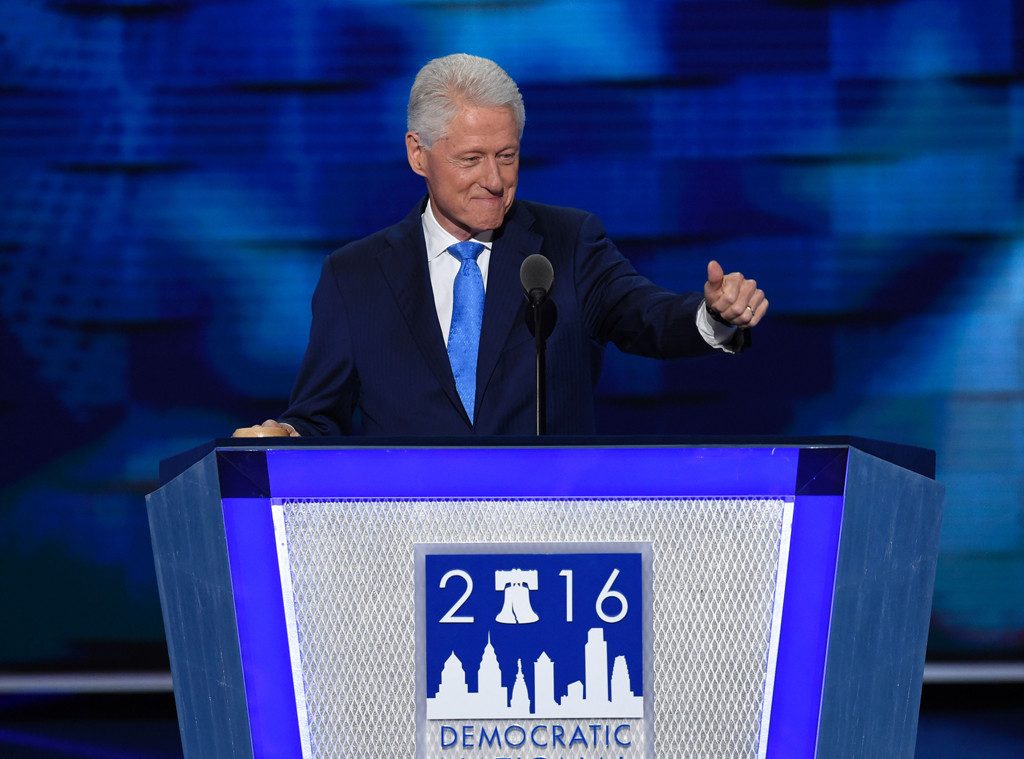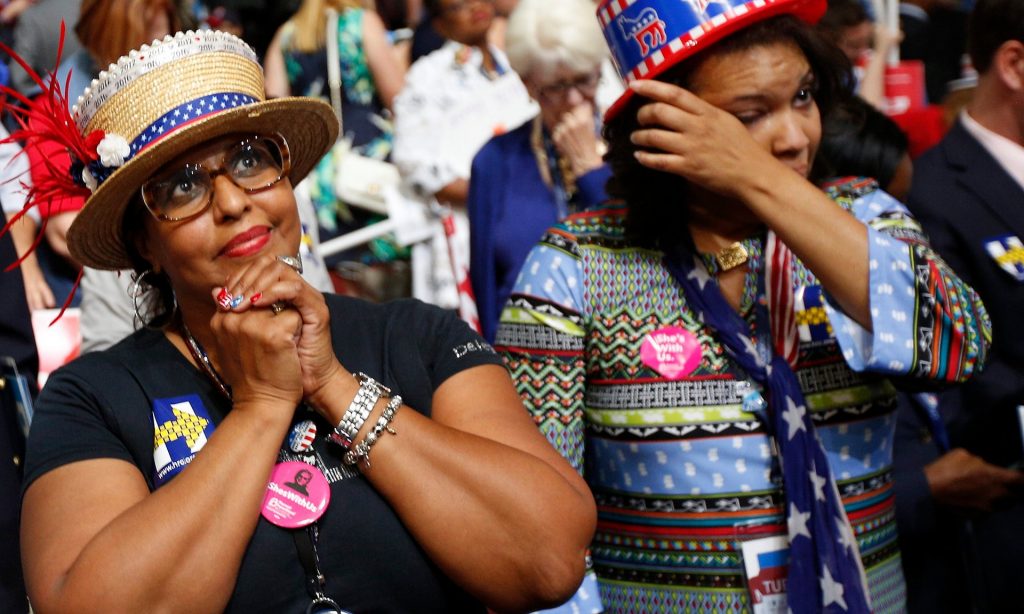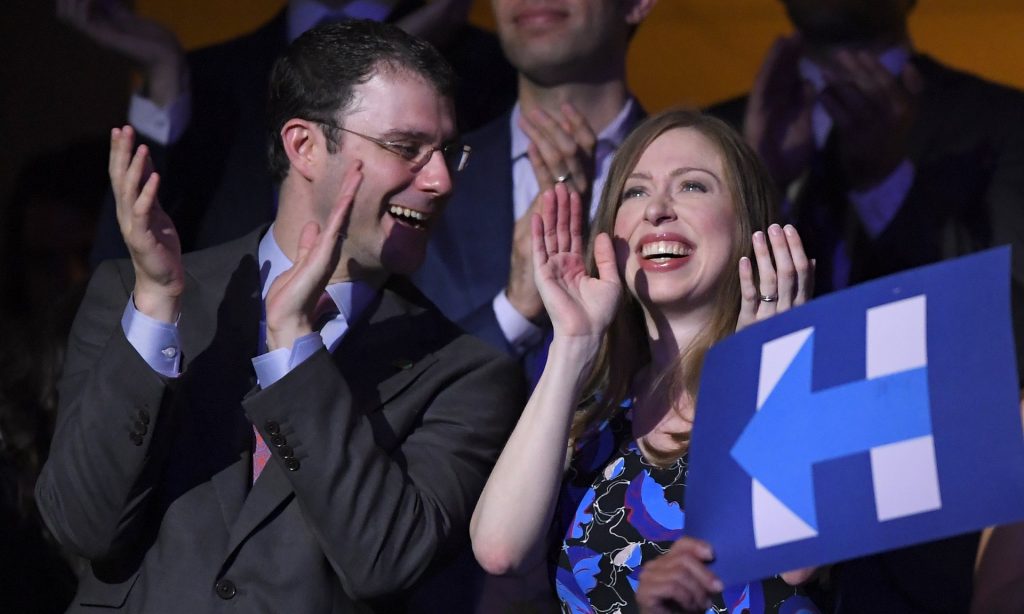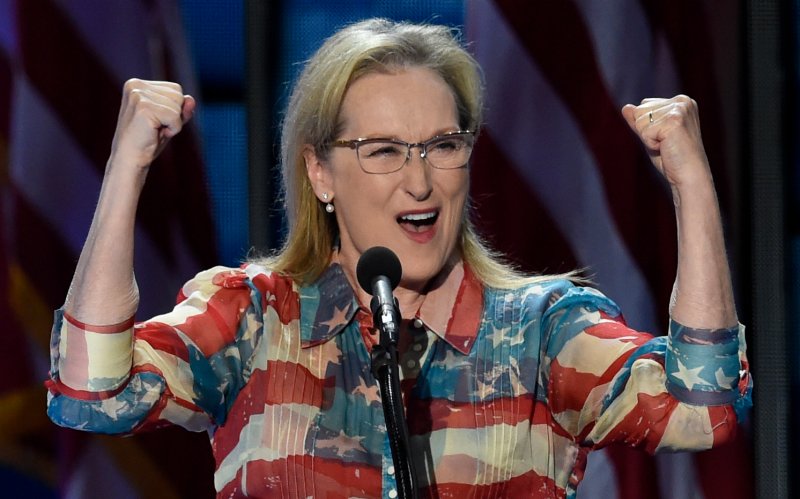
Hillary Clinton’s historic moment finally arrived on Tuesday night, accompanied by an intensely personal speech from her husband Bill, that sought to recast her image as a symbol of the political establishment.
“She’s the best darn change-maker I ever met in my life,” insisted the former president, recalling decades of Hillary Clinton’s work as socially radical. “This woman has never been satisfied with the status quo in anything.”
On a night when she became the first woman to be nominated by a major party to run for the White House, Hillary Clinton fully embraced the historical significance of the occasion.
She joined the party by live satellite link from New York to the accompanying sound of breaking glass, disrupting a black and white montage of the 44 male presidents of the United States who have gone before her.
“I can’t believe we just put the biggest crack in that glass ceiling yet,” said Clinton. “If there are any little girls out there who stayed up late to watch, can I just say, I may become the first woman president but one of you is next.”
Amid a growing populist challenge from Republican Donald Trump and scenes of revolt from some Bernie Sanders supporters, her husband’s powerfully persuasive speech may go some way to restoring momentum to the campaign.
“Hillary will make us stronger together,” he said. “You know it, because she spent a lifetime doing it. I hope you will do it. I hope you will elect her. Those of us who have more yesterdays than tomorrows tend to think more about our children and grandchildren.”
The speech capped a pivotal day for the party, as it sought to move on from scenes of division, and capitalise on Clinton’s symbolic breakthrough.
She will address the crowd directly on Thursday in a formal acceptance of the nomination but for now, speeches first from Michelle Obama and now from Bill Clinton have done the most to counter a much darker vision of America presented by Republican candidate Donald Trump.

Photograph: Justin Lane/EPA
“If she wins she’s coming back for you to take you along on the ride for America’s future,” said former president Clinton as he recalled campaigning with coalminers in West Virginia and urged to the party to do more to create more new jobs in the US economy.
It was almost the only overtly political message of his own. In contrast with past speeches, where the former president has risked overshadowing the campaign, this one sounded more like the personal speeches made by the wives of male candidates.
In an azure blue tie that picked out the colours of the arena, and with his hands shaking slightly, Clinton delivered a highly personal account of their courtship and marriage that seemed at times to be an attempt to make America fall in love with the girl he first met in the spring of 1971.
Skipping over the awkward moments in a very public, and at times visibly flawed, marriage, Clinton instead said: “I married my best friend,” recalling two failed proposal attempts and then describing when Clinton’s water broke during her pregnancy with Chelsea – undoubtedly a first in a speech about a US presidential candidate.
“The first time I saw her was in a class on political and civil rights … [she had] big blond hair, big glasses, wore no makeup and exuded a sense that I found magnetic,” said a clearly infatuated and somewhat awed Clinton. “I knew I might be starting something I couldn’t stop.”
After spending nearly an hour describing her political and personal accomplishments he turned only briefly to her opponent. And he issued a direct challenge to the two-dimensional “cartoon” image of his wife which had been painted by her political foes.
“How does this square with what you heard at the Republican convention? One is real, the other is made up,” said Bill. “You just have to decide which is which my fellow Americans … Good for you, because earlier today you nominated the real one.”

Photograph: Mark J Terrill/AP
The well-received speech, seeking to rewrite the accepted wisdom about her candidacy, may help galvanise the campaign in much the same way Bill Clinton helped revive Barack Obama’s listless 2012 effort.
But the space was created by another reconcilation between competing Democrats earlier in the evening.
Bernie Sanders left the arena with his head held high on Tuesday. In contrast to the chaotic scenes of protest from his supporters that marred attempts at unity on day one, the room largely came together for the historic night, with few boos at all.
The healing was helped by fresh opportunities for the Sanders campaign to celebrate its success and vow to continue its fight for more radical social reform. “Because this is a movement fueled by love it can never be stopped or defeated,” said Hawaii congresswoman Tulsi Gabbard as she formally proposed Sanders for the nomination.
Shortly before calling for a suspension of the rules to move directly to the nomination of his former rival, Sanders appeared emotional as he listened to his tearful brother Larry announce delegates from the Democrats Abroad primary.
The pageant of democracy hid some controversy too. A small group of Sanders supporters staged a sit-in of the media centre, largely in protest at the party’s use of superdelegates to bolster Clinton’s margin of victory in states where Sanders won the most votes.
Clinton, was at home watching events from her New York home in Chappaqua, but her daughter Chelsea was on hand in a venue packed with rising female stars from the Democratic party and wider US society.
Former secretary of state Madeleine Albright, herself a noted breaker of glass ceilings, received one of the warmest welcomes of the evening for a commanding speech that listed Clinton’s foreign affairs experience. Trump, she claimed, “has already done damage just by running for president”.

Oscar winner Meryl Streep signed off the night by asking: “What does it take to be the first female anything? It takes grit and it takes grace.”
Placing Clinton in a lineage of great American women from Rosa Parks and Amelia Earhart to Harriet Tubman and Eleanor Roosevelt, she told the delegates: “You people have made history and you’re gonna make history again in November because Hillary Clinton will be our first woman president … she’ll be the first but she won’t be the last.”
Lena Dunham, creator and star of the HBO series Girls, led a series of celebrity endorsements that joined the dots between Clinton’s breaking of glass ceilings and Trump’s dismissive comments about women.
“According to Donald Trump, my body is probably like, a two,” she began. “His rhetoric about women takes us back to a time when we were meant to be beautiful and silent.”
“Donald Trump is not making America great again; he is making America hate again,” added fellow actor America Ferrera, from the TV series Ugly Betty.
California senator Barbara Boxer emerged on stage to the soundtrack from Rocky, Philadelphia’s de facto theme tune. “Are you ready to elect the very first woman president of these United States of America?” “Yes!” came a reply that sounded less hesitant than usual, as confidence among Democrats grows.
Some of the most powerful political messaging came via prepared video footage that interspersed live speakers with clips of Trump: exposing his lack of respect for women, or damning him with his own words as he described pregnancy as an irritant for employers.
There were also the first hints of the national security issues, which are likely to be a big feature of the latter part of week. Republicans watching on television have criticised the Philadelphia convention for ignoring pressing safety issues, in a stadium devoid of the usual flags that tend to dominate US political sets.
Survivors of the 9/11 attack on New York paid moving testimony to the support they received from Clinton as a local senator. “When New York needed her, she was there,” said Lauren Manning, a burn victim whose emotional speech provided some of the most powerful character testimony yet.
Others tried a lighter tack in the campaign’s conscious effort to try to humanise a candidate still regarded as aloof and chilly by some Americans.
Kentucky secretary of state Alison Lundergan Grimes began the night recalling that the soon-to-be nominee loves lifestyle TV “and can devour buffalo wings”. Barbara Mikulski said Clinton would fight for “macaroni and cheese” issues, boasting again of her taste for down-to-earth food.
There were echoes of a similar attempt to add color to the larger-than-life media image of Trump at last week’s Republican convention, as both campaigns grapple with the historically low favorability ratings of both candidates. But while Trump was pictured as a ruthless winner by his business associates, Clinton surrogates queued up to claim she was a people-person – the opposite of the public stereotype.

